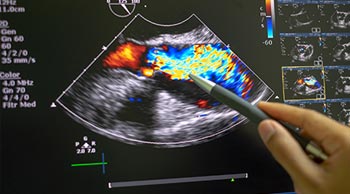Oneida Health
What is an Electrocardiogram
 An electrocardiogram, also called ECG or EKG, is a test that records the electrical activity of your heart. It is a quick and painless test and can be done in a doctor’s office or hospital. Ambulances are equipped with ECG machines. Some smartwatches have ECG monitoring capability.
An electrocardiogram, also called ECG or EKG, is a test that records the electrical activity of your heart. It is a quick and painless test and can be done in a doctor’s office or hospital. Ambulances are equipped with ECG machines. Some smartwatches have ECG monitoring capability.
Why the Test is Performed
Your doctor may use an ECG to detect the following:
- Abnormal heart rhythm
- If blocked or narrowed heart arteries are causing your chest pain or heart attack
- Whether you have had a heart attack in the past
- How well certain heart treatments are working, such as a pacemaker
You may need an ECG if you have any of the following symptoms:
- Chest pain
- Dizziness, lightheadedness, or confusion
- Heart palpitations
- Rapid pulse
- Shortness of breath
- Weakness, fatigue, or inability to exercise
- You have a family history of heart disease
Sometimes a traditional ECG can not capture the heart activity that may come and go. In those cases, your doctor may ask you to wear a continuous ECG monitor. See Holter/Event Monitor for more information.
How to Prepare for the Test
Tell your doctor about any medications, including herbs and supplements you are taking. They may affect the accuracy of the test.
What to Expect During the Test
The test can be done in a doctor’s office or hospital and can be conducted by a nurse or technician.
- You will be given a gown to wear and asked to undress.
- You will be asked to lie down on an exam table or bed.
- Up to 12 electrodes will be attached to your skin. If you have hair where the electrodes need to be placed, the hair may need to be shaved to ensure the electrodes can stick.
- The electrodes are connected to a monitor which will record the electric signals that make your heartbeat. A computer records the information and displays it as waves on a monitor.
- You may breathe normally, but you will need to lie still, Be sure you are warm enough, as shivering can affect the accuracy of the test.
What the Test Results Show
The results of the ECG can determine if your heart activity is normal, or if you need further tests. Your doctor will review the test results and look for any potential problems, such as:
- Heart rate
- Heart rhythm
- Heart attack
- Inadequate blood and oxygen supply to the heart
- Structural abnormalities
Potential Risks of the Test
The ECG is a safe and painless procedure. After the electrodes are removed, you may have slight discomfort and/or minor rash where they were placed on your body.